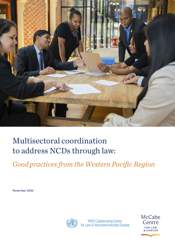
A new report from the McCabe Centre for Law & Cancer shows how countries in the Western Pacific are bringing together diverse stakeholders to use law and legal frameworks to address the world’s number one killer: noncommunicable diseases (NCDs).
 Read the report
Read the report
Multisectoral coordination to address NCDs through law: Good practices from the Western Pacific Region draws on case studies from the region, pulling out lessons for how multisectoral coordination can help develop, implement, enforce and defend legislation to prevent and control NCDs.
“NCDs are more than just a health issue. Their burden is felt across all segments of society, impacting the health, social and economic wellbeing of the entire population,” says Hayley Jones, Acting Director of the McCabe Centre. “The case studies in this report demonstrate that a whole-of government and a whole-of-society approach is crucial to advancing legal measures to address NCDs. These lessons are more important than ever as our societies grapple with COVID-19.”
Role of multisectoral coordination in addressing NCDs
NCDs including cardiovascular diseases, cancer, diabetes, chronic respiratory diseases and mental health disorders are responsible for more than 70% of deaths globally, and more than 80% of deaths in the Western Pacific. The need for multisectoral coordination has been identified in several international and regional NCD strategies, including the WHO Global Action Plan on the Prevention and Control of NCDs 2013–2030 and the Western Pacific Regional Action Plan for the Prevention and Control of NCDs 2014–2020.
The McCabe Centre’s report finds that multisectoral coordination is most effective when it engages a range of stakeholders from different parts of government and the broader community. But who to include – and who to exclude – in multisectoral coordination bodies will depend on the context and aims of the body. The report also describes the importance of high-level leadership to fostering collaboration across sectors, and good practices for creating and sustaining multisectoral coordination bodies. Underlying all of these, the law and legal frameworks are crucial to enabling collaboration, ensuring coordination, and providing protection against conflicts of interest or misuses of power.
Lessons on multisectoral coordination
- A wide range of sectors and stakeholders should be included, but who to include depends on context
Involving sectors beyond just departments/ministries of health – including other government departments, enforcement agencies, and community groups – can make multisectoral coordination bodies more effective.
- Who is not included is just as important as who is
Certain industries may need to be explicitly restricted from participating in order to protect public health policy from conflicts of interest.
- High-level leadership is crucial
Strong political commitment and support from high-level leaders can provide a sense of urgency and foster collaboration across government and civil society.
- Law can play an important role
Law can help establish multisectoral coordination bodies, provide clarity on their functions and responsibilities, and ensure their sustainability.
Multisectoral coordination in the WHO Western Pacific Region
The report was produced in collaboration with the World Health Organization (WHO) Regional Office for the Western Pacific, as part of the McCabe Centre’s work as the WHO Collaborating Centre on Law and Noncommunicable Disease.
Many case studies in the report were provided by McCabe Centre alumni, a global network of lawyers and policymakers from low and middle-income countries who have participated in the International Legal Training Program. Case studies include examples of multisectoral action to reduce salt consumption in Mongolia, pass comprehensive alcohol control laws in Vietnam, and establish a National NCDs Committee in Tonga.
Alumni will speak more about their local experience with multisectoral coordination at an upcoming McCabe Centre event.
Webinar: Multisectoral coordination to address NCDs through law
Join the McCabe Centre for Law & Cancer and special guests for a webinar about the role of multisectoral coordination in legal measures to prevent and control NCDs.
Presenters from the McCabe Centre, the World Health Organzation and others will discuss the findings of the report, case studies from the Western Pacific region, and other insights on how multisectoral coordination can be harnessed to address cancer and other NCDs.
As countries around the world grapple with COVID-19 and the social and economic impacts of the pandemic, this event provides a timely opportunity to share lessons on the role of legal frameworks and strategies for collaborative public health action across government and society.
Date: Thursday 26 November
Time: 13.00- 14.00 AEDT (convert to your time)
Where: Online via Microsoft Teams
Register now
Stay informed about the McCabe Centre's work using law to prevent and control NCDs by subscribing to our newsletter